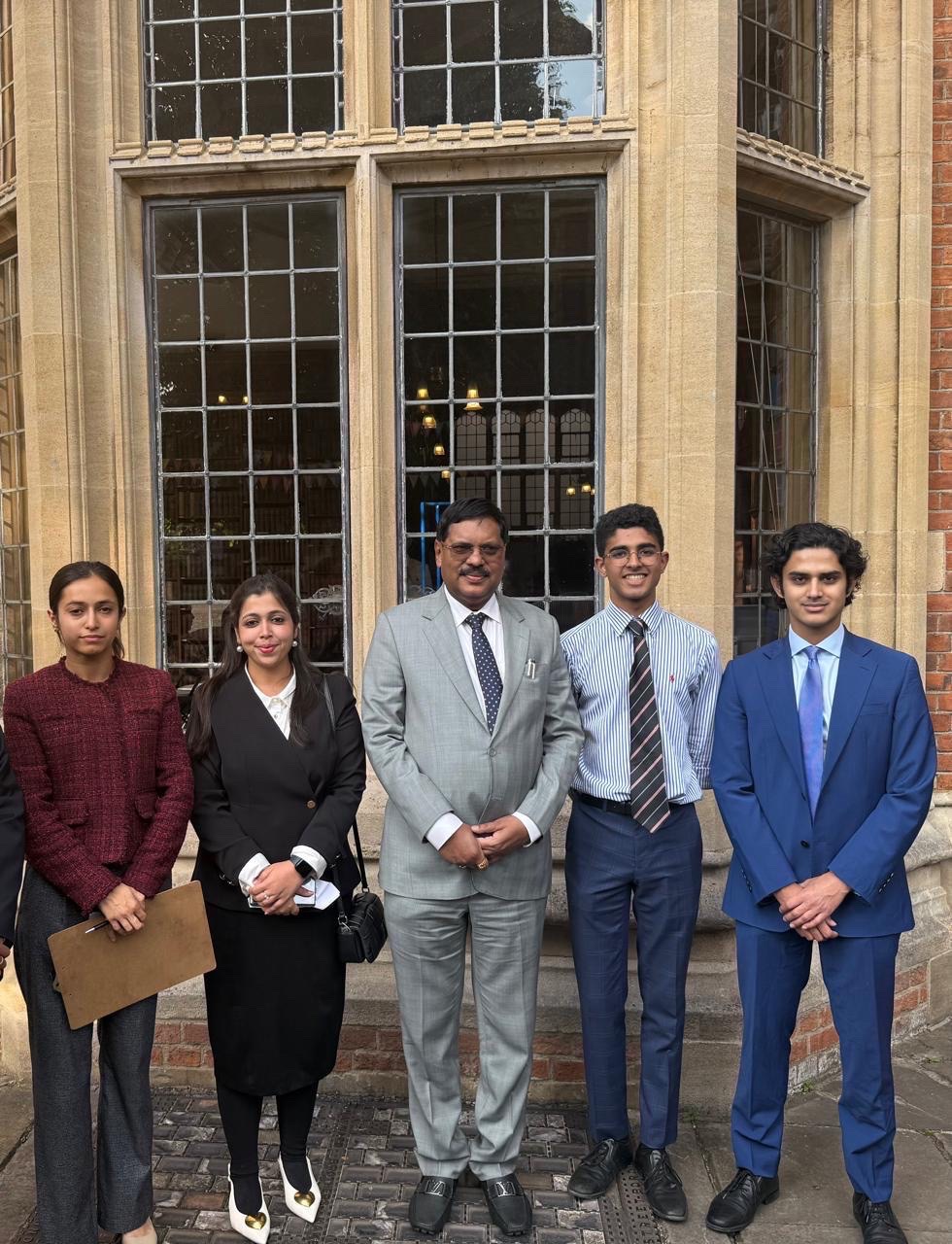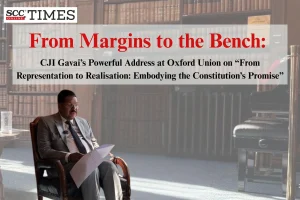In a momentous event held at the prestigious Oxford Union, Justice B.R. Gavai, Chief Justice, Supreme Court of India, delivered a powerful keynote address on the theme “From Representation to Realisation: Embodying the Constitution’s promise.” The session was a significant reflection on the enduring legacy of Dr. B.R. Ambedkar and its relevance in contemporary society.

The event commenced with introductory remarks by Ms. Tanvi Dubey, Advocate-on-Record, Supreme Court of India, who set the tone for the evening by contextualizing the importance of Dr. Ambedkar’s vision in shaping India’s constitutional and social landscape.
Keynote Address by Justice Gavai
Justice Gavai, in his keynote address, offered profound insights into how Dr. Ambedkar’s life and ideals have personally influenced and guided him. He spoke eloquently on the themes of representation, social justice, and the ongoing journey toward true equality, echoing Ambedkar’s vision for an inclusive and equitable society. Justice Gavai’s reflections interwove historical context with contemporary relevance, making a compelling case for the continued realisation of Ambedkar’s dream in today’s India.
Justice Gavai began with a powerful reflection on his own journey, from a municipal school to the highest judicial office in the country, as a testament to the Constitution’s transformative promise. Speaking candidly, he remarked:
“Many decades ago, millions of citizens of India were called “untouchables”. They were told they were impure. They were told that they did not belong. They were told that they could not speak for themselves. But here we are today— where a person belonging to those very people is speaking openly, as the holder of the highest office in the judiciary of the country”
“This is what the Constitution of India did. It told the people of India that they belong, that they can speak for themselves, 1 and that they have an equal place in every sphere of society and power.”
He emphasised that for India’s most vulnerable, the Constitution is not merely a legal charter or a political framework, but a lifeline, a feeling, and a quiet revolution etched in ink.
Justice Gavai powerfully underscored the transformative nature of the Indian Constitution, describing it as “a social document, one that does not avert its gaze from the brutal truths of caste, poverty, exclusion, and injustice.” He emphasised that the Constitution does not indulge in the fiction that all are already equal in a deeply divided society; instead, it has the moral courage to intervene, “to rewrite the script, to recalibrate power, and to restore dignity.” According to Justice Gavai, the Constitution “carries within it the heartbeat of those who were never meant to be heard, and the vision of a country where equality is not just promised but pursued.” In its deepest essence, he said, it is “a moral declaration—that the lives of the oppressed are not accidents of fate, but souls entitled to justice, worthy of representation, opportunity, and voice.”
Justice Gavai reminisced about a profound and often overlooked truth from the framing of India’s Constitution: that many of the country’s most vulnerable communities were not merely the subjects of constitutional concern but were active participants in its making.
“From Dalits and Adivasis, to women, minorities, persons with disabilities, and even those once unjustly branded as ‘criminal tribes’—their presence in the Constituent Assembly was a collective demand for justice,” he noted.
These historically oppressed groups, he said, sought not charity but recognition, dignity, and rightful inclusion in the nation’s constitutional future.
“To be seen in the Constitution was to be seen by the nation. To be included in its text was to be included in its future,” he remarked.
This ideal of representation, Justice Gavai emphasised, found its most enduring and powerful expression in the vision of Dr. B.R. Ambedkar, a towering jurist and social reformer who rose from the most marginalized strata of society.
“The Constitution of India carries within it the heartbeat of those who were never meant to be heard, and the vision of a country where equality is not just promised, but pursued. It compels the State not only to protect rights but to actively uplift, to affirm, to repair”.
Dr. Ambedkar, having studied at Columbia University, the London School of Economics, and Gray’s Inn, embodied a rare blend of intellectual brilliance and moral conviction. His work, as Justice Gavai underscored, was dedicated to securing justice, representation, and equality for all those historically denied dignity and voice.
Dr. Ambedkar’s Legacy and the Moral Force of Representation
Justice Gavai delved into the foundational vision of Dr. B.R. Ambedkar, underscoring his belief that representation is not a procedural formality, but a democratic and moral imperative. Ambedkar’s emphasis on representation as a tool of empowerment and justice was a recurring theme.
He emphasised that Dr. Ambedkar wielded his vast knowledge and deep convictions to tirelessly advocate for the rights of the marginalized—not only Dalits, but also Adivasis, women, religious minorities, and all those historically denied dignity and access to power. As Chairman of the Drafting Committee of the Indian Constitution, Dr. Ambedkar played a visionary and decisive role in embedding safeguards and affirmative measures into the constitutional framework, with special emphasis on the principle of representation.
Justice Gavai noted that Dr. Ambedkar believed that political representation could awaken political consciousness, giving vulnerable communities a voice, a stake, and a rightful platform within the democratic system.
Justice Gavai further reflected that in a society marked by deep-rooted inequality, change would not come naturally; thus, the Constitution had to carry a binding mandate to protect, empower, and ensure inclusion. In Ambedkar’s vision, democracy could not survive unless power was shared not only among institutions, but also among historically excluded communities, making representation a tool for redistributive justice and social transformation.
Justice Gavai highlighted pivotal judicial decisions that have shaped India’s inclusive framework, including:
-
State of Kerala v. N.M. Thomas, (1976) 2 SCC 310
-
Indra Sawhney v. Union of India, 1992 Supp (3) SCC 217
-
National Legal Services Authority v. Union of India, (2014) 5 SCC 438
-
Ministry of Defence v. Babita Puniya, (2020) 7 SCC 469
Justice Gavai eloquently remarked that the true beauty of Indian democracy lies in its ability to evolve—even as the nation commemorates 75 years of the Constitution, it continues to “reflect, renew, and reimagine” the scope and substance of representation. He highlighted that this ongoing journey of constitutional growth was exemplified just last year, when Parliament passed a historic constitutional amendment providing political reservations for women in Parliament and state legislatures. This, he noted, is a testament to the Constitution’s living spirit—one that adapts to the changing needs of society while staying true to its foundational promise of equality, inclusion, and justice.
Listening to the Subaltern Voice
In a powerful closing reflection, Justice Gavai referred to Gayatri Chakravorty Spivak’s iconic question, “Can the Subaltern Speak?”, responding:
“Yes, the subaltern can speak—and they have been speaking all along. The question is no longer whether they can speak, but whether society is truly listening.”
Justice Gavai’s address at the Oxford Union was not only a reaffirmation of India’s constitutional ideals but also a deeply personal meditation on representation, dignity, and moral courage. His speech stood as a testament to the enduring power of the Constitution to transform lives and uplift voices that history once tried to silence.
A Fitting Close to a Visionary Address
Following his address, the session transitioned into a moderated discussion led by Ms. Pawlin Hammer who posed a series of thoughtful questions that further explored Justice Gavai’s views on constitutionalism, judicial responsibility, and social transformation.
The floor was then opened for an engaging audience Q&A session, where Justice Gavai responded to a wide range of questions covering critical issues such as the role of technology in justice delivery, the inclusivity of women in the legal system, and the importance of equal representation across all levels of governance and society.
The event served not only as a tribute to Dr. Ambedkar’s enduring legacy but also as a reminder of the work that still lies ahead in making his vision a living reality. Justice Gavai’s address was both inspiring and thought-provoking, leaving a lasting impression on all in attendance.

